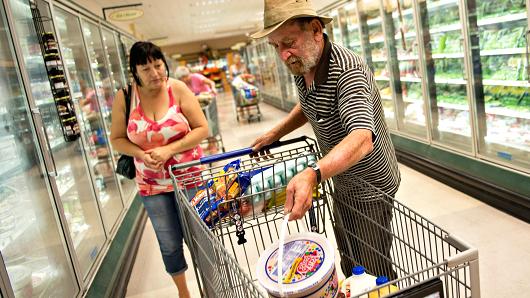As Amazon takes Whole Foods national, Kroger thinks local
Kroger is now making it a priority to partner with local brands at its supermarket stores across the U.S., right as Amazon-owned Whole Foods prepares to step back similar efforts.
Just last week, Kroger announced plans to roll out a website aimed at luring more local brands to its stores.
Currently, Kroger sources from thousands of local suppliers, but it's looking to grow that number, according to Mike Donnelly, Kroger's executive vice president of merchandising and procurement.
Kroger, which owns other supermarkets including Ralphs and Harris Teeter, is now inviting local vendors to join its team. Kroger's new website reads: "Kroger Loves Local" and "We Are Local."
Food sampling and in-store education about local brands will continue to be a part of the Kroger shopping experience, a Kroger spokeswoman told CNBC. The chain also wants to grow the dialogue around shopping and eating local.
Retail rival Whole Foods is meantime looking to follow a different strategy, simplifying operations and cutting back on some local initiatives. Beginning next year, the organic supermarket chain will reportedly no longer allow brand representatives to promote their products, nor can they check stores to make sure items are stocked and displayed correctly, according to The Wall Street Journal.
It's long been the norm for local brands to set up tables throughout Whole Foods stores during peak selling hours, offering samples and educating shoppers on niche items. It's served as a way for smaller brand names to market themselves, when they might not be noticed on a shelf at first glance.
"Whole Foods once found a way for local brands to have a great American story come to life ... [they] allowed brands to come into aisles, to tell their stories," Mike McDevitt, CEO of Baltimore-based meal-kit company Terra's Kitchen, told CNBC.
"While it's great to hear that the doors of Kroger are being open [to local brands] now, they're probably going to be cracked open, not wide open," McDevitt said. Whole Foods, he said, was becoming too difficult to manage from a national, profit-driven perspective.
"All Whole Foods Market stores will continue to sell local products, and our buyers remain committed to discovering and incubating local and innovative brands," Whole Foods spokeswoman Brooke Buchanan told CNBC in a statement.
Whole Foods will also begin to centralize its decision-making regarding brands' product assortment, the Journal reported.
Instead of allowing brands to pitch their products on a local scale, for example, Whole Foods' top executives will choose a higher percentage of the inventory moving forward, the publication said, citing conversations between Whole Foods and third-party brand representatives during a series of recent closed-door meetings.
A Whole Foods spokeswoman had told the Journal that "having brand advocates in stores is distracting to employees and inefficient." The new system, she told the publication, aims to cut costs and take a "national approach."
Time will tell if Whole Foods shoppers agree — or even notice — Amazon's push to nationalize the chain.
A study by location intelligence company Foursquare found a 25 percent increase in foot traffic at Whole Foods stores over the first two days, Aug. 28 and 29, that the company was owned by Amazon.
Since then, though, traffic has dropped off, Foursquare told CNBC in a follow-up study. In its second week under Amazon's wings, from Sept. 4 to Sept. 10, traffic was only up about 8 percent when compared with an "average" week in August 2017.
To be sure, Kroger has taken a beating ever since the Amazon-Whole Foods deal was announced in mid-June. Its stock is down more than 40 percent in 2017 alone.
Yet, Kroger isn't giving up without a fight, recently announcing new initiatives like its plans to open a "comfort food" restaurant, called Kitchen 1883, at a store near its corporate headquarters in Cincinnati.
Kroger is also growing its meal kits business, which it calls Prep+Pared. The company has been adding the kits to additional Kroger stores this month. Just last week, grocery chain Albertsons announced it would acquire meal kits business Plated, sending Blue Apron shares higher on speculation that there's hope for that sector after all.
"Kroger is making a wise move strategically in reaching out to local and emerging brands as the number of such brands are growing, and consumers are interested in having access to such brands," Brittain Ladd, a retail strategy, supply chain and logistics consultant, told CNBC.
"Kroger continues to prove they're the best grocery retailer in the United States, and they will continue to fight for their customers and brands," Ladd added. "Amazon has no choice but to implement strategies that will increase operational efficiencies."
best food
amusing
nice
Good
wow
wow
awesome
Good
awesome
wonderful
Good